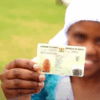Kenya’s Betting Control and Licensing Board (BCLB) is proposing new rules for how the country’s betting industry operates. In a move aimed at bringing order to the fast-growing but chaotic gambling sector, the board now wants all new betting account registrations to include a selfie of the user holding their national ID card.
The proposed requirement is one of several measures presented to the National Assembly’s Departmental Committee on Finance and Planning. BCLB Director Peter Mbugi told lawmakers that the selfie-ID rule is designed to stop underage users from opening betting accounts using someone else’s documents. Often, those of their parents or older siblings.
The identity verification rule could mark a turning point in regulating one of Kenya’s most active digital economies. Betting platforms have experienced explosive growth over the past decade. Primarily driven by the rise of mobile penetration and the ease of digital payments. However, this growth has come with little in the way of guardrails for consumer protection.
The BCLB Rules to Raise the Entry Bar for Operators
Alongside the new registration requirements, BCLB is proposing a significant increase in the minimum capital needed to operate in the gambling industry. For small betting shops, the board wants to raise the entry capital from the current KES 10,000 to KES 50 million. For casinos, the figure jumps to KES 5 billion, while online gambling platforms and national lottery operators must deposit at least KES 200 million to qualify for a license.
These steep thresholds are designed to eliminate speculative entries and reduce the number of operators in the market. Mbugi noted that over 236 betting companies were licensed in 2024 alone. At the same time, more than 106 unauthorized gambling websites were shut down by the board. This was in partnership with the Communications Authority of Kenya.
The rapid increase in both legitimate and rogue operators has overwhelmed regulators, creating an environment where enforcement becomes reactive rather than preventive. By increasing capital requirements and tightening operational rules, BCLB aims to streamline the sector and ensure that only serious players remain.
Stricter Controls on Advertising in the New BCLB Rules
Another critical aspect of the proposed changes is the regulation of advertising. According to Mbugi, all betting-related advertisements will now need approval from the Kenya Film Classification Board (KFCB). Additionally, these ads will only be permitted outside of the watershed period, effectively treating them as adult content.
This move follows growing concern about the impact of gambling ads on minors and vulnerable users. Over the past few years, gambling has become highly visible on TV, radio, social media, and even in local events. Thus, prompting criticism from both parents and mental health professionals.
By introducing a classification requirement and time rules, BCLB aims to curb the normalization of betting among young people. The board sees media messaging as one of the key drivers of increased gambling activity in the country.
Spotlight on Popular Games Like Aviator
During the parliamentary session, lawmakers expressed specific concern over Aviator. A high-speed multiplier game that has gained popularity among younger audiences. In Aviator, players must cash out their virtual bets before a digital plane crashes, with winnings increasing the longer the plane stays airborne.
Due to its fast-paced, high-stakes design, Aviator has been criticized for its addictive nature. BCLB now requires explicit approval for any advertisements related to Aviator or similar algorithm-based games.
The board’s stance reflects a broader recognition that digital-era betting products require a different regulatory approach. Unlike traditional sports betting or casino games, newer formats use psychological hooks and real-time feedback to keep users engaged.
Modernizing Outdated Legislation
Kenya’s current betting laws are based on the Betting, Lotteries and Gaming Act of 1966. At the time, gambling in the country was limited mainly to church raffles, occasional casinos, and charity sweepstakes.
Today’s betting environment is a vastly different landscape, dominated by mobile apps, digital wallets, and AI-powered games. As a result, BCLB is calling for a comprehensive overhaul of existing rules to align with the realities of the modern gambling ecosystem.
The new Gambling Control Bill proposes the establishment of a centralized monitoring system to track all licensed betting operations in real-time. The system would provide regulators with a single platform for visibility into revenue, compliance, and customer protection. This digital oversight is seen as crucial for ensuring the new laws are enforced and that betting companies stay within defined boundaries.
Also Read: How to Self-Exclude from Betting in Kenya. A Step-by-Step Guide to Self-Exclusion
Addressing the Social Costs of Gambling
Beyond the economic and technological concerns, the reform agenda is rooted in growing awareness of gambling-related harm. Over the past decade, gambling addiction has become a major social issue, especially among youth. Reports of financial ruin, family conflict, and school dropouts linked to betting are now standard.
Mbugi emphasized that underage gambling remains one of the most pressing problems. The mandatory selfie requirement is just one of the tools BCLB hopes to use to stop minors from accessing betting platforms.
While critics may argue that some of the proposed rules are too strict or will push users toward offshore or underground platforms, the BCLB maintains that its long-term goal is a safer and more transparent industry. The board is also looking at international best practices to ensure the new regulatory framework is globally aligned.
What’s Next with the Proposed BCLB Rules?
The proposed rules are currently under review by Parliament. If passed and signed into law by the president, they could be implemented within the next regulatory cycle. Betting firms, especially those operating on thin margins or without local roots, will have to decide whether to comply with the new standards or exit the Kenyan market altogether.
For users, the most immediate change will be the selfie-ID requirement during registration. While this may add friction to the onboarding process, BCLB believes it’s a necessary step in restoring integrity to the sector.
As Kenya moves to modernize its gambling regulations. The new laws could become a reference point for other countries in the region facing similar challenges. The question now is how betting firms, advertisers, and users will adapt to the new normal.
















